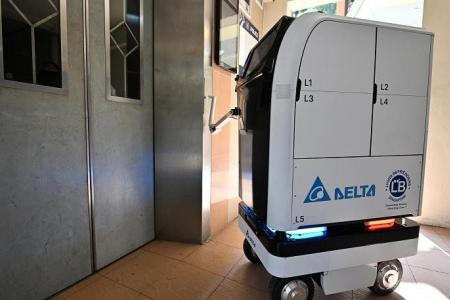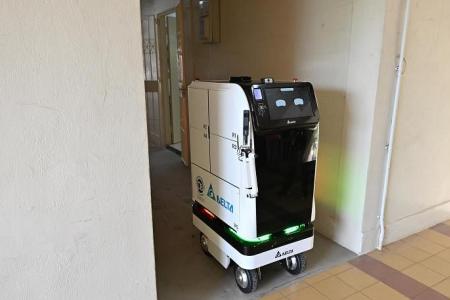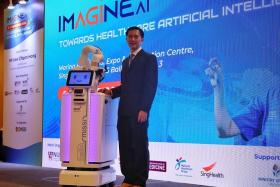Robot ‘butler’ trial launched at HDB rental block to deliver meals to homebound seniors
At an ageing block of rental flats in Queenstown, Aiden the robot works as a “butler”. Somewhat resembling a photocopier machine, it has been roped in to deliver meals to a group of frail seniors living in rental flats, under an existing programme that allows them to live independently.
Aiden – its full name is Autonomous Intelligence for Delivery and Engagement – rides the smallish lifts and navigates the narrow corridors on its own. It has a small arm that can extend to press lift buttons to call for the lift and select the floor.
“It is like a human being taking the lift,” said Ms Karen Wee, executive director of Lions Befrienders (LB), the social service agency that is collaborating on this trial with Delta Electronics Singapore, a firm which specialises in industrial and building automation solutions.
Other types of delivery robots require lifts to be equipped with Bluetooth or Wi-Fi in order for them to communicate with the lift. Installing this could cost around $300,000, said Ms Wee.
The trial for Aiden was officially launched at Block 151 Mei Ling Street on Oct 13, and will run till February 2024.
The autonomous mobile robot delivers two meals daily to seniors aged 67 to 82, as well as other items such as laundry or medication, if needed.
The seniors are beneficiaries of LB’s senior group home programme, which helps homebound seniors who cannot buy or prepare their own meals and have no caregivers to help them do so.
LB has just one staff member under the programme, and she has been delivering the meals to seniors, together with volunteers and now, “micro-jobbers”. In August, LB rolled out a scheme that pays seniors $1 for each meal they deliver in their spare time.
With Aiden, the sole staff member can be freed up to do other tasks such as social bonding and conducting sessions to slow the onset of dementia such as art therapy and photo reminiscence sessions, Ms Wee said.
Last week, Mr Seow Thian Kee, 73, who is retired, opened his door to Aiden, which announced, “I have arrived at my destination”. Aiden scanned a QR code on Mr Seow’s pass and popped open a compartment door, allowing him to retrieve the items in it.

Mr Seow, a former factory supervisor, is single and used to rent a HDB room, but moved to the co-sharing rental flat after being admitted to hospital for a fall. He can walk only very slowly as he is prone to falls.
“Nowadays, I am so used to technology. I know it is here to help us,” he said. “If the robot wants to come in to my flat to do something, that’s also okay. I’ve seen news (programmes) where robots are used to deliver food and do other things.”
In the next phase, Aiden will deliver necessities to a larger group of frail seniors under another programme in the next block, said Ms Wee. A second Aiden will also be trialled in LB’s senior group home programme in Tampines, and will soon be trained to recognise its routes.
While the cost of the robots is not yet fixed, Ms Wee says it could be amortised over several years. “There’ll be manpower savings, and Singapore does not have enough manpower for eldercare,” she said.
LB is seeking funding to acquire a few Aiden robots after the entire trial ends, she added.
Get The New Paper on your phone with the free TNP app. Download from the Apple App Store or Google Play Store now



